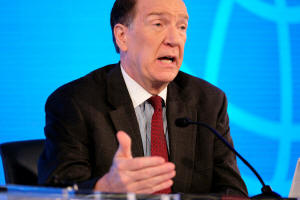|
Chad on Friday confirmed a Reuters report that it had reached a
debt agreement with Swiss commodities trader Glencore Plc and
other creditors, but sources said the deal will not reduce the
overall debt level.
"The World Bank remains deeply concerned about debt
sustainability in developing countries, including in Chad,"
Malpass told Reuters. "The agreement reached by the creditors
provides no immediate debt reduction. As a result, the debt
service burden of Chad remains heavy and is crowding out
priority expenditures on food, health, education and climate.”
Malpass said he had advocated that debt treatments reached under
the Common Framework - a mechanism created by the Group of 20
major economies to help poor countries weather the fallout from
the COVID-19 pandemic - include actual debt reductions.
Chad was the first country to request debt treatment under the
framework and the first to reach a deal with creditors.
A source familiar with the negotiations told Reuters on Thursday
that it would include a reprofiling to stretch out Chad's debt
payments in 2024, but no debt "haircut."
"For longer-term sustainability beyond the window of this
agreement, there needs to be a mechanism to reduce the debt,"
Malpass said, noting that Chad faced large development needs,
mounting domestic debt, and exposure to frequent shocks,
including volatility in oil prices.
Glencore and creditors had argued that Chad did not need debt
relief at the moment since higher oil prices had lifted its
revenues, but Malpass said changes in the oil price could leave
Chad vulnerable in the future.
(Reporting by Andrea Shalal; Editing by Aurora Ellis and
Jonathan Oatis)
[© 2022 Thomson Reuters. All rights
reserved.]
This material may not be published,
broadcast, rewritten or redistributed.
Thompson Reuters is solely responsible for this content.

|
|





